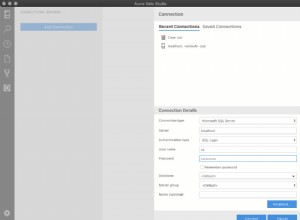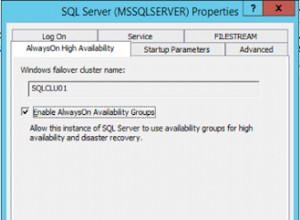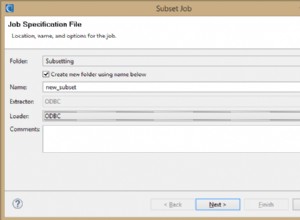MODIFICA :per prevenire condizioni di gara
in ambienti simultanei, usa WITH (UPDLOCK) nella sottoquery correlata o EXCEPT 'd SELECT . Lo script di test che ho scritto di seguito non lo richiede, poiché utilizza tabelle temporanee visibili solo alla connessione corrente, ma in un ambiente reale, operando contro tabelle utente, sarebbe necessario.
MERGE non richiede UPDLOCK .
Ispirato dalla risposta di Mcl in merito a:unique index e lasciare che il database generi un errore, ho deciso di confrontare inserimenti condizionali rispetto a try/catch .
I risultati sembrano supportare l'inserimento condizionale su try/catch, ma YMMV. È uno scenario molto semplice (una colonna, una piccola tabella, ecc.), eseguito su una macchina, ecc.
Ecco i risultati (SQL Server 2008, build 10.0.1600.2):
duplicates (short table)
try/catch: 14440 milliseconds / 100000 inserts
conditional insert: 2983 milliseconds / 100000 inserts
except: 2966 milliseconds / 100000 inserts
merge: 2983 milliseconds / 100000 inserts
uniques
try/catch: 3920 milliseconds / 100000 inserts
conditional insert: 3860 milliseconds / 100000 inserts
except: 3873 milliseconds / 100000 inserts
merge: 3890 milliseconds / 100000 inserts
straight insert: 3173 milliseconds / 100000 inserts
duplicates (tall table)
try/catch: 14436 milliseconds / 100000 inserts
conditional insert: 3063 milliseconds / 100000 inserts
except: 3063 milliseconds / 100000 inserts
merge: 3030 milliseconds / 100000 inserts
Nota che, anche su inserti unici, c'è leggermente più sovraccarico da provare/catturare rispetto a un inserimento condizionale. Mi chiedo se questo varia in base alla versione, alla CPU, al numero di core, ecc.
Non ho confrontato il IF inserimenti condizionali, solo WHERE . Presumo il IF varietà mostrerebbe un sovraccarico maggiore, poiché a) avresti due istruzioni e b) dovresti racchiudere le due istruzioni in una transazione e impostare il livello di isolamento su serializzabile (!). Se qualcuno vole per verificarlo, dovresti cambiare la tabella temporanea in una normale tabella utente (serializzabile non si applica alle tabelle temporanee locali).
Ecco lo script:
-- tested on SQL 2008.
-- to run on SQL 2005, comment out the statements using MERGE
set nocount on
if object_id('tempdb..#temp') is not null drop table #temp
create table #temp (col1 int primary key)
go
-------------------------------------------------------
-- duplicate insert test against a table w/ 1 record
-------------------------------------------------------
insert #temp values (1)
go
declare @x int, @y int, @now datetime, @duration int
select @x = 1, @y = 0, @now = getdate()
while @y < 100000 begin
set @y = @y+1
begin try
insert #temp select @x
end try
begin catch end catch
end
set @duration = datediff(ms,@now,getdate())
raiserror('duplicates (short table), try/catch: %i milliseconds / %i inserts',-1,-1,@duration,@y) with nowait
go
declare @x int, @y int, @now datetime, @duration int
select @x = 1, @y = 0, @now = getdate()
while @y < 100000 begin
set @y = @y+1
insert #temp select @x where not exists (select * from #temp where col1 = @x)
end
set @duration = datediff(ms,@now,getdate())
raiserror('duplicates (short table), conditional insert: %i milliseconds / %i inserts',-1,-1,@duration, @y) with nowait
go
declare @x int, @y int, @now datetime, @duration int
select @x = 1, @y = 0, @now = getdate()
while @y < 100000 begin
set @y = @y+1
insert #temp select @x except select col1 from #temp
end
set @duration = datediff(ms,@now,getdate())
raiserror('duplicates (short table), except: %i milliseconds / %i inserts',-1,-1,@duration, @y) with nowait
go
-- comment this batch out for SQL 2005
declare @x int, @y int, @now datetime, @duration int
select @x = 1, @y = 0, @now = getdate()
while @y < 100000 begin
set @y = @y+1
merge #temp t using (select @x) s (col1) on t.col1 = s.col1 when not matched by target then insert values (col1);
end
set @duration = datediff(ms,@now,getdate())
raiserror('duplicates (short table), merge: %i milliseconds / %i inserts',-1,-1,@duration, @y) with nowait
go
-------------------------------------------------------
-- unique insert test against an initially empty table
-------------------------------------------------------
truncate table #temp
declare @x int, @now datetime, @duration int
select @x = 0, @now = getdate()
while @x < 100000 begin
set @x = @x+1
insert #temp select @x
end
set @duration = datediff(ms,@now,getdate())
raiserror('uniques, straight insert: %i milliseconds / %i inserts',-1,-1,@duration, @x) with nowait
go
truncate table #temp
declare @x int, @now datetime, @duration int
select @x = 0, @now = getdate()
while @x < 100000 begin
set @x = @x+1
begin try
insert #temp select @x
end try
begin catch end catch
end
set @duration = datediff(ms,@now,getdate())
raiserror('uniques, try/catch: %i milliseconds / %i inserts',-1,-1,@duration, @x) with nowait
go
truncate table #temp
declare @x int, @now datetime, @duration int
select @x = 0, @now = getdate()
while @x < 100000 begin
set @x = @x+1
insert #temp select @x where not exists (select * from #temp where col1 = @x)
end
set @duration = datediff(ms,@now,getdate())
raiserror('uniques, conditional insert: %i milliseconds / %i inserts',-1,-1,@duration, @x) with nowait
go
truncate table #temp
declare @x int, @now datetime, @duration int
select @x = 0, @now = getdate()
while @x < 100000 begin
set @x = @x+1
insert #temp select @x except select col1 from #temp
end
set @duration = datediff(ms,@now,getdate())
raiserror('uniques, except: %i milliseconds / %i inserts',-1,-1,@duration, @x) with nowait
go
-- comment this batch out for SQL 2005
truncate table #temp
declare @x int, @now datetime, @duration int
select @x = 1, @now = getdate()
while @x < 100000 begin
set @x = @x+1
merge #temp t using (select @x) s (col1) on t.col1 = s.col1 when not matched by target then insert values (col1);
end
set @duration = datediff(ms,@now,getdate())
raiserror('uniques, merge: %i milliseconds / %i inserts',-1,-1,@duration, @x) with nowait
go
-------------------------------------------------------
-- duplicate insert test against a table w/ 100000 records
-------------------------------------------------------
declare @x int, @y int, @now datetime, @duration int
select @x = 1, @y = 0, @now = getdate()
while @y < 100000 begin
set @y = @y+1
begin try
insert #temp select @x
end try
begin catch end catch
end
set @duration = datediff(ms,@now,getdate())
raiserror('duplicates (tall table), try/catch: %i milliseconds / %i inserts',-1,-1,@duration,@y) with nowait
go
declare @x int, @y int, @now datetime, @duration int
select @x = 1, @y = 0, @now = getdate()
while @y < 100000 begin
set @y = @y+1
insert #temp select @x where not exists (select * from #temp where col1 = @x)
end
set @duration = datediff(ms,@now,getdate())
raiserror('duplicates (tall table), conditional insert: %i milliseconds / %i inserts',-1,-1,@duration, @y) with nowait
go
declare @x int, @y int, @now datetime, @duration int
select @x = 1, @y = 0, @now = getdate()
while @y < 100000 begin
set @y = @y+1
insert #temp select @x except select col1 from #temp
end
set @duration = datediff(ms,@now,getdate())
raiserror('duplicates (tall table), except: %i milliseconds / %i inserts',-1,-1,@duration, @y) with nowait
go
-- comment this batch out for SQL 2005
declare @x int, @y int, @now datetime, @duration int
select @x = 1, @y = 0, @now = getdate()
while @y < 100000 begin
set @y = @y+1
merge #temp t using (select @x) s (col1) on t.col1 = s.col1 when not matched by target then insert values (col1);
end
set @duration = datediff(ms,@now,getdate())
raiserror('duplicates (tall table), merge: %i milliseconds / %i inserts',-1,-1,@duration, @y) with nowait
go




